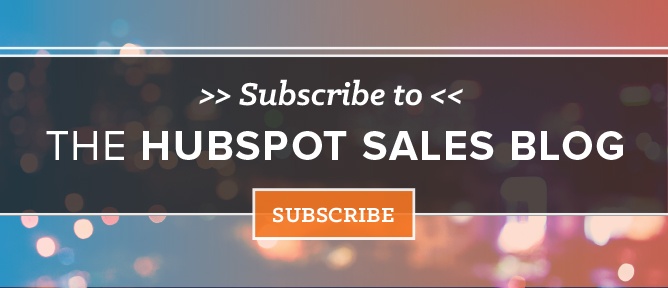
If you've been reading HubSpot's Sales blog long enough, you know that we're firm believers that sales is about advising and helping, not disqualifying and closing. "Always Be Helping" is one of our mantras, a play onGlengarry Glen Ross' "Always Be Closing" quote. Unlike in decades past, before the internet changed the sales profession forever, today’s buyer is more informed and doesn’t fall for cheesy closing lines or techniques. They buy when they’re good and ready, and when they’re convinced you can help them better than anyone else can.
但是,这在实践中意味着什么?当然,销售是关于帮助的。您实际上如何每天做?当您感到取消资格的冲动时,您如何提供帮助?当您知道早日关闭并且经常不再起作用时,您如何以及何时关闭?您如何拥抱专注于帮助并仍然超出您的销售目标?
The trick is to never let your prospect think you want the sale more than they need and want to buy from you. To do this, I encourage salespeople to ask themselves three simple questions -- in sequential order -- before they even think about closing:
- Can I help them?
- Do they need my help?
- Do they want my help?
1) Can I help them?
This is the first question I ask, and usually the easiest one to answer. Depending on what you sell, you may even be able to figure out if you can help the prospect before you pick up the phone to call them.
For example, if you sell a service that helps a company's website pages load faster for a site visitor, you can measure the current speed. Or if you sell a product that helps organizations improve employee happiness, you can look bad Glassdoor reviews and build out your list of targets. If you sell roofing or painting services, you can开车去看别人的房子. Maybe you’re an expert at online marketing; you can use tools likeMarketing GraderandWebsite Grader确定您的潜在客户正在犯的错误。
But in other cases it might not be obvious whether or not your service could help a prospect. To determine if your offering could truly benefit a buyer, you'll have to do some research. Talk to employees, customers, vendors, or anyone else who can give you insight about the company’s current situation and priorities. Eventually, you'll strike up a conversation with influencers and decision makers within your target company.
不管您如何弄清楚是否可以提供帮助,这个问题的重点是确定您是否可以以某种方式改善一个人的世界或业务;也就是说,您是否可以帮助他们省钱,赚钱或避免一些风险。请记住,他们可能不愿意承认您可以尽早帮助他们。他们可能还不了解您如何帮助他们。但这在此阶段并不重要 - 关键是要弄清楚您是否可以在正确的条件下帮助他们。
如果这个问题的答案是“是的”,那你have a prospect. Now it's time to move on to the next question -- where the selling actually begins.
2)他们需要我的帮助吗?
这个问题对于销售人员来说可能很棘手。许多人认为,如果第一个问题的答案是“是”,那么这个问题的答案也必须为“是”。但这并不总是正确的。实际上,我发现这很少是正确的。问题是,销售人员通常会倾向于认为每个有特定问题的人都需要他们的帮助。
我建议采用另一种方法,而不是立即尝试将产品的利益与潜在客户的问题相匹配,而不是确定潜在客户是否需要您的帮助。我建议您戴上怀疑的帽子,对自己说:“我绝对可以帮助他们,但让我们真正弄清楚他们是否会成功地使用我的产品或服务。”如果他们不会成功使用您的产品,那么他们肯定不需要它。
要做到这一点,首先要问的是无论not they have goals that require changing from the status quo. If a company is happy with the status quo, they probably don't need help. For example, if you sell services that reduce employee turnover, but the company is happy with 20% annual turnover, they don't need your help. Or let’s say a business owner's goal is to simply do what they did last year -- in this case, he probably doesn’t need your time-saving, money-saving, profit-making device. Every company sets priorities. Chances are slim that your services will line up perfectly with the current priorities. If this is the case, don’t be too eager to pitch them what you do. They probably don't need your help.
However, this doesn't mean you should give up right away, and certainly not forever. In fact, I often cite Warren Greshes (author ofThe Best Damn Sales Book Ever) when counseling salespeople: “They need what I have. They will buy it from someone. So, they might as well buy it from me.”
真正弄清楚某人是否需要您的帮助nowyou must listen and explore their past, present and future. Put yourself in their shoes and make an objective decision from their perspective. It’s helpful for me to map out their situation in the following eight buckets:
- Goals:What are their personal and business goals?
- 计划:What are their current plans for achieving these goals and how confident they are that the plans will help them achieve the goal? What other plans are they considering?
- Challenges:What are the previous, current, and anticipated challenges that might get in the way?
- Timeline:What is their timeline for achieving their goals, implementing their plans, and overcoming any challenges?
- Budget:致力于实现目标的预算是什么?如果需要,可以从其他费用中重新分配的预算是多少?实现我们现在可以投资的目标的预期好处是什么?
- Authority:谁是决策过程中的影响者?谁受到变革的影响?
- Consequences:无所作为的负面后果是什么?如果他们无法实现目标或执行计划会发生什么?如果他们只是错过时间表,会发生什么?
- 含义:What are the positive implications if a goal is achieved within the timeline and budget?
If you come to the conclusion that the prospect does in fact need your help, it’s then time to figure out whether theywantit.
3) Do they want my help?
As you’re figuring out whether or not your prospect needs your help, you'll probably get your prospect to acknowledge that they have a need, an important goal, a frustrating challenge, or maybe multiples of all three. If you can get them to really open up, they’ll acknowledge the negative consequences of failure and the positive implications of success.
在这一点上,请戴上专家帽子,并开始与他们一起提出解决方案。但是,在介绍演示,编写建议或发送合同之前,我建议您在口头和协作中与他们共同创建一个新计划(当然,您扮演关键角色)。详细说明他们将如何实现自己的目标和/或克服挑战。包括他们购买后将要做的一切,但也描述为了实现目标所需的每一步。通过与您的前景一起探索这些观点,您将使他们思考和想象 - 甚至梦想 - 如果他们雇用您的帮助,他们的世界将会是什么样子。
During this process, draw on the best practices you (or your company) have learned when you've helped others like the prospect. By adding success stories that resonate with them, they’ll begin to believe that you can really help them. Secure verbal buy-in and commitment from your prospect as you go through the plan together.
At the end of this process, don’t be afraid to ask the final question: “Do you want my help?” The answer should be a simple “yes.”
但是,我不建议您提出问题,直到您相信答案是肯定的。请记住,您戴着怀疑论者的帽子,您永远不会想让他们认为自己想让销售比他们想要的更多。当他们要求您购买时,最好的接近发生。那时您知道自己已经钉了这个过程。
您准备好拥抱“始终在帮助”吗?
这是我弄清楚我是否可以帮助某人,是否真的需要它以及他们是否想要的三步过程。从来没有让我失败。总是帮助我弄清楚我是否可以帮助某人取得他们想要的成功水平。
For many sales reps, this process is contrary to what they’ve been taught. It goes against the decades-old “Always be Closing” and it flies in the face of the approach of “disqualify early and often." But in my career, I’ve found that being helpful always wins in the end. I often have old prospects or customers come back to me after more than a decade because they trust I’ll be able to help them, or that I’ll honestly tell them when I can’t.
As a result, I have no shortage of people who refer me to friends and peers or references who speak highly of my expertise, and I’m sure many of you do too. But I know that some salespeople don’t. If you’re one of the latter, I hope this process can help you get better at helping. If you truly embrace helping, I promise it’ll also help you close more business more effectively than you’ve ever dreamed.
Originally published Jan 6, 2016 8:30:00 AM, updated February 01 2017
Topics:
入站销售Don't forget to share this post!
Related Articles



Expand Offer
ctasales计划模板
现在就得到
